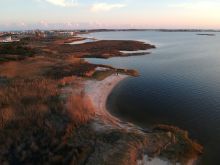
People who feel connected to the environment are more inspired to take care of the environment, and that is the inspiration for the Outer Banks Environmental Film Festival as well as a new podcast, Finding Hope in the Climate Crisis.
The second annual film festival will screen 23 films from November 1 to 3 in Manteo. The inaugural podcast episode premiers Friday, October 18 at 11 a.m.
WHY A FILM FESTIVAL?
The Outer Banks Environmental Film Festival is an education outreach project for the Peace Garden Project, which aims to increase the accessibility of fresh food in local communities and reduce food waste.
“We want to inspire people to understand and believe that one person can make a difference for our environment,” says Rev. Michelle Lewis, founder and executive director of Peace Garden Project. “People tend to think they are too young or too old or too busy to make a difference, but it really is all of us working together in whatever capacity we are able that will create real change.”
The films focus on local, regional and worldwide environmental issues – "but they all come down to creating healthy environments and protecting clean air and clean water for humans, animals and plants to survive and thrive," Lewis says.
The film medium makes environmental messages accessible to a wider audience.
“Everyone watches movies,” she says. “We are trying to make it accessible so that everybody can have a foundational understanding of the environmental issues here and around the world. These are stories not just of flora and fauna, but also of the people who are affected by environmental challenges.”
She encourages everyone to come with a sense of curiosity, an open mind and a willingness to learn.
“I hope people will come out to meet new people and learn about these issues, learn about filmmaking and meet some of the filmmakers, and learn how to advocate for causes and policy change,” Lewis says. “This is especially important with local situations going on like the oil leak in the ocean down in Buxton. Situations like that will only change when groups of people are advocating for change together.”
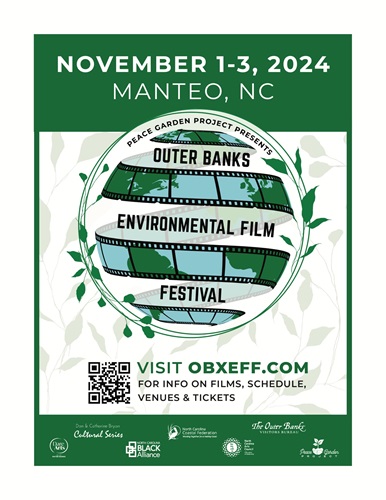
THE FILMS
The first Outer Banks Environmental Film Festival was held in 2023. The selection committee considered 46 submissions and screened 16 in Manteo. A highlight of last year’s festival was the presence of 12-year-old Prin Uthaisangchi of Thailand, whose film on leatherback sea turtles, The Story of the Leatherback, was one of those screened. He made the film when he was 11.
The festival has already grown for its second year. The number of entries nearly doubled to 78 submissions, and the selection committee chose 23 to screen for this year. Lewis says she hopes the festival will continue to grow and that they’re already starting to get inquiries about submitting for the 2025 festival, which they will start accepting as soon as this year’s festival wraps.
Lewis assures these is something that will appeal to everyone.
Here’s just a small sampling of what you can expect in 2024:
The Ash Wednesday Storm in Nags Head March 5 – 9, 1962, directed by Raymond Wallace – the one local film tells the story of the legendary storm that wreaked havoc on Nags Head for three days
Our Movement Starts Here, directed by John Rash and Melanie Dang Ho – the story of a rural N.C. community that fought a toxic landfill and inspired an international environmental justice movement
The Man of the Trees, directed by Andrea Trivero – the story of a horticulturist in Sub-Saharan Africa. Disabled by polio as a child, he found a way to work and to thrive despite his physical challenges and environmental challenges
Gardening for the Planet, directed by Joanne L. Hershfield – a call to action about the potential of native plant gardening to combat climate change
Giants of the Deep: The Whale Shark Story, directed by Dr. Alongkot Chukaew – the story of a 14-year-old scuba diver who has been exploring the Gulf of Thailand and the Andaman Sea in search of whale sharks
Blue Glacier: Then & Now, directed by Will Freund - a climate change story of Chip Freund returning to Blue Glacier after his first visit 40 years ago
Reimagining Queen Nanny of the Maroons, directed by Udemba Mclean and Leo R. Douglas - a retelling of the story of Queen Nanny, national heroine of Jamaica, shaman of the forests, healer, priestess, protector of watersheds
Some films are short and sweet, ranging from 5 to 30 minutes, and others are full-length documentaries of an hour or more. The films span regions all over the world. “We are trying help people see the connections that link all of us around the world,” Lewis says.
Audience members will have the chance to vote for the Audience Favorite Award. All tickets holders can vote for the award, and the Awards Ceremony will be open to all.
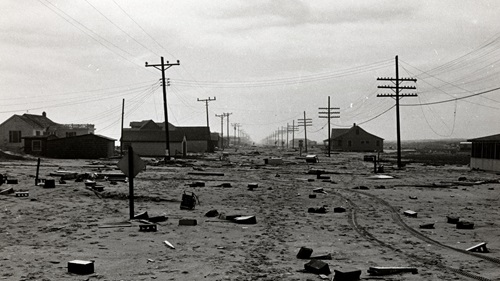
Photo: The Ash Wednesday Storm in Nags Head March 5-9, 1962, a 30-minute documentary, will run at the Outer Banks Environmental Film Festival on Saturday at 10 a.m.
THE TICKETS
There are a variety of very affordable ticket options.
VIP Festival Pass - $100 includes films and VIP Reception on the rooftop deck at The Pearl Hotel
Movies Only Festival Pass - $40
Nov. 1 Single Day Pass - $25
Nov. 1 Single Day Family Pass Movies Only - $50
Nov. 2 After Party Pass - $50
Nov. 2 Single Day Pass - $25
Nov. 2 Family Pass Movies Only - $25
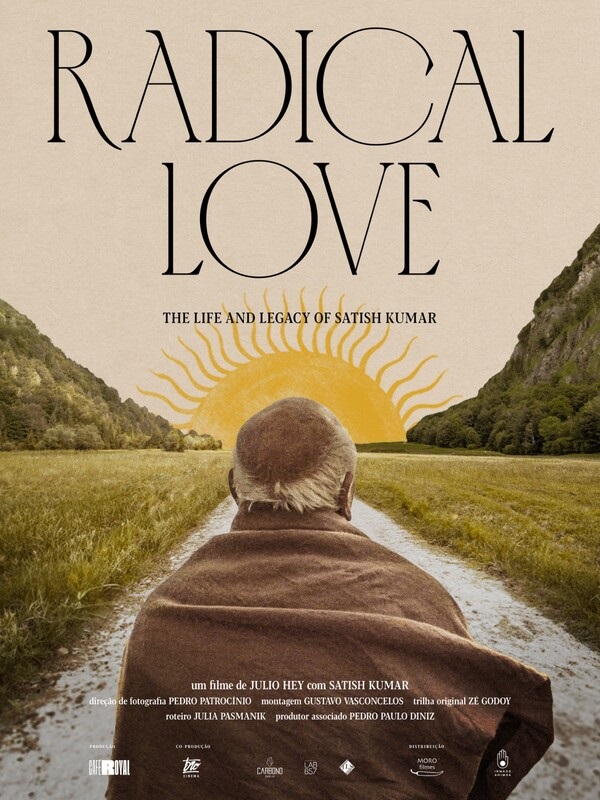
Photo: Radical Love: The Life and Legacy of Satish Kumar tells the story of a former monk, activist, author and educator who has been inspiring global change for nearly 70 years.
THE LOCATIONS
Films will be shown at Dare Arts on November 1 from 12 noon to 10:30 p.m., at College of the Albemarle on November 2 from 10 a.m. to 6 p.m. and back at Dare Arts on November 2 from 6 to 8 p.m. The Awards Ceremony will be held 8:15 to 8:45 p.m. at Dare Arts with an After Party at Waterfront Trellis from 9 to 11 p.m. The festival will wrap with a Guided Garden Meditation, Beach Yoga and brunch on Sunday, November 3, open to all.
THE GOOD CAUSE
Proceeds from the Outer Banks Environmental Film Festival go to support young people in the community through scholarships and the Youth Leadership Institute.
“People should feel good about coming and where the money is going,” Lewis says.
Funds also support Peace Garden Project, which partners with Roanoke Island Presbyterian Church and the Community Care Clinic of Dare to feed families and seniors in the community.
Funds also go to provide lodging for the independent filmmakers who are able to come to the festival for the screening of their film and to talk about their film. There are opportunities to engage with filmmakers during the festival.
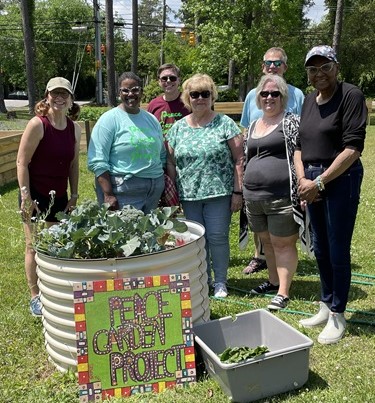
Photo: The Peace Garden Project grows food at its Manteo garden to provide fresh food for everyone.
THE PODCAST
In yet another way to engage audiences, Lewis has also created a new podcast, Finding Hope in the Climate Crisis, which launches at 11 a.m. on Friday, October 18.
“It’s a way to keep building momentum for film festival throughout the year and also tell climate stories and make communities better,” Lewis says.
The first guest is Jeri Hilt, an environmental educator and artist and a juror for the Outer Banks Environmental Film Festival.
During the film festival, Lewis will also be recording live podcasts with festival filmmakers.
You can find the podcast on Apple Podcasts, iHeart Radio and other podcast platforms. The podcast is produced by Hermit House Productions.
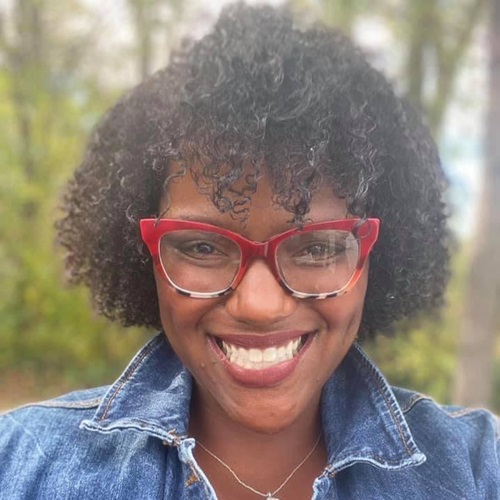
Photo: Dr. Michelle Lewis founded Peace Garden Project and the Outer Banks Environmental Film Festival and works with a large team of volunteers to make them happen.
THE FOUNDER
By reading this you might have deduced that Dr. Michelle Lewis is great asset to the Outer Banks community and beyond with the Peace Garden Project, Outer Banks Environmental Film Festival and Finding Hope in a Climate Crisis Podcast. Oh, and she’s also the pastor of Roanoke Island Presbyterian Church and an Agent for Thriving for Climate and Environmental Justice at the Ormand Center for Duke Divinity School.
With an impressive education – a B.A. in Communication from Elizabeth City State; an M.A. in Communication (Film Directing) from Regent University; the first person of color to graduate from Yale University with Joint Master's degrees (Master of Environmental Science/Master of Divinity) from Yale School of Forestry and Environmental Studies and Yale Divinity School; certificate in liturgy from Yale Institute of Sacred Music and the Arts; a Doctorate from Candler School of Theology at Emory University; and a Certificate in Leadership, Organizing, and Action from the Harvard Kennedy School for Executive Leadership – she is inspiring positive change in our community, and I have a feeling this is all just the beginning!


 Molly Harrison is managing editor at OneBoat, publisher of OuterBanksThisWeek.com. She moved to Nags Head in 1994 and since then has made her living writing articles and creating publications about the people, places and culture of the Outer Banks.
Molly Harrison is managing editor at OneBoat, publisher of OuterBanksThisWeek.com. She moved to Nags Head in 1994 and since then has made her living writing articles and creating publications about the people, places and culture of the Outer Banks.

